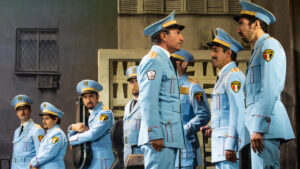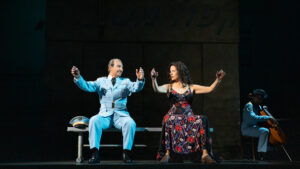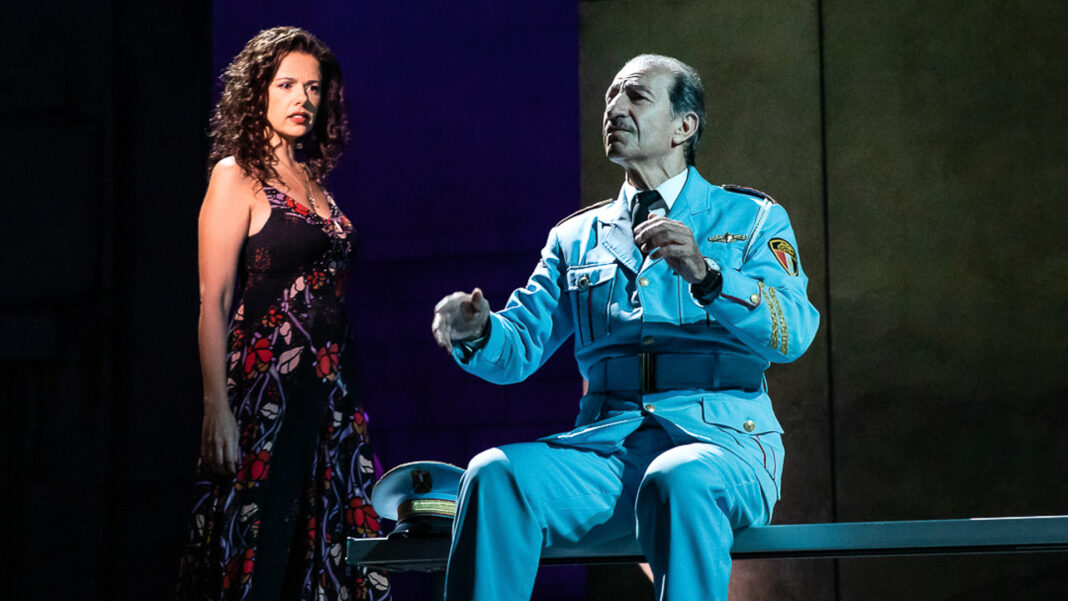In 2008 a film by Eran Kolirin was released that told the story of an Egyptian band missing their performance at an Arab arts center because they went to the wrong town and ended up in Israel. The Band’s Visit received over 45 international film awards – several of them for its lead actor Sasson Gabay who played the role of Tewfiq.
Eight years later the actor found himself reprising that role in the David Yazbek/Itamar Moses musical version of the film that won 10 Tony Awards including Best Musical. Gabay took over the role originated on stage by Tony Shalhoub.
Gabay, who was born in Iraq and raised in Israel, is back on stage as Tewfiq in the touring production of The Band’s Visit. This wonderful musical is concluding its run in Los Angeles at the Dolby Theatre this week. After the holidays the tour will resume in Portland and continue performances across the country through the end of July.
Last week I spoke by phone with Gabay about revisiting Tewfiq, his relationship with the character and what the musical is saying about international relations. What follows are excerpts from our conversation that have been edited for length and clarity.
Mr.Gabay, in a 2008 interview director Eran Kolirin said that this was a very personal role for you. What made it so personal then and how personal has it been for you to revisit the character of Tewfiq on stage in this musical?

[Eran] wanted to met me and he wanted to audition me for the part. And he gave me just the short synopsis of the script and I think four or five lines about the character. And immediately, just from reading this, I felt connected to it. And I told him, “Look, I don’t want to do the audition, but I know this man. I know this character and I feel it.” After a while he called me to say, “OK, let’s let’s not waste our energy on this and continue working on the casting.”
It’s true. The minute I read a little bit about the script, about the story and the character, I knew. Sometimes you get it on the spot immediately. That’s what happened with Tewfiq. I felt connected. I think that his personality is something for me. In one way, he’s formal and he’s very strict. And inside he’s very soft and very artistic. So that kind of a paradox within his personality I felt it instantly.
In 2010 the producer of the musical Orin Wolf came to Israel and asked me about the idea of doing the musical out of it. It’s a crazy idea because this film is so delicate. And I mean, they managed to do it beautifully. He approached me again at 2018 and I did join the play on Broadway and then managed to do this very delicate musical – which is not a typical musical on Broadway. I spent one year on Broadway and then I joined the tour for the first year until the COVID crisis. And now when they resume, I joined it again. So it’s personal in many ways.
How has your relationship with the character evolved since the time you first portrayed him on stage?
You know, I matured during this year in age and then also in experience as an actor. I think I added more weight to the character, more maturity. And I allowed myself to be more and more patient with the character. I think I take my time. I think I allow ourselves to be more confident enough to take the right pauses and to breathe within the character. We are changing all the time so it’s got an effect on how you project the character.
One of the things I love most about the musical is the amount of subtext there is. What is your role as an actor in making that subtext accessible for the audience and hopefully translate that into an emotional response?

If you’re precise and exact in the specific moment in the scene and you are transparent emotionally, the audience sees things are really revealing. I think it was quite tricky and very nice. David Yazbek and Itamar Moses adapted and David Cromer directed it. They’ve done a beautiful job – all three. It’s not all of a sudden the characters sing the song. It’s done within the situation to the moment that words aren’t enough and and the characters start to sing. And so it reveals the subtext and the inner emotions of the characters.
You expect there to be great confrontation because of what we’ve understood about the politics of each country’s relationship to one another. But it seems to me that the film and the musical basically say that the people are not necessarily the politics of their country. And I’m wondering how important you think that is as part of the story that gets told.
First of all, I agree with you completely. It’s the exact description of the thing. I don’t know if it was intentionally intended to project this idea. But you know, politics is politics and people are people. People need each other and they are very alike wherever they are. I think you can transfer this play and this script into other places in the world where there used to be confrontation and now the people are meeting and it’s so different. It’s very different from from the headlines, from the politics, from the news on TV. So I think it emphasizes our need to open up to one another. Because of politics people tend to protect themselves, close themselves towards something that is not familiar to them. But once this has opened it becomes whole life and the relations of people.
Getting that message out today must be deeply gratifying.
The journey is wonderful for all of us. In a way we are kind of messengers of humanity. I remember when we shot the film we had a feeling that we had something really special, but we didn’t know to what extent. I’m really grateful that after so many years this film became such a beautiful musical and so many people see this. It’s a privilege for me.
For tickets at the Dolby Theatre go here. For details of the tour schedule and tickets go here.
Photo: Janet Dacal and Sasson Gabay in The Band’s Visit (Photo by Evan Zimmerman/Courtesy Broadway in Hollywood)











